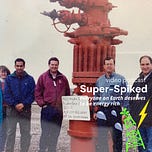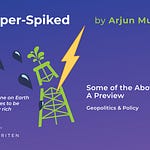WATCH the video on YouTube by clicking the RED button above.
LISTEN to audio only via the Substack player by clicking the BLUE button above.
STREAM audio only on Apple Podcasts, Spotify, or your favorite podcast player app.
DOWNLOAD a pdf of the slide deck by clicking the blue Download button below.
For the last month of summer, we are aiming to produce a series of hopefully short videos that highlight key lessons from the last 30 years of what we are calling perpetual transition in the energy space with an aim to offer insights on the go forward view. Energy transition itself has become a loaded term of late, typically referring to the idea that the world will be transitioning away from fossil fuels to renewables, over some arbitrarily short time frame like by 2050. We do not agree that this version of “energy transition” is on-track to happen or would be desirable from a human prosperity standpoint.
But that does not mean nothing is changing. In fact, over the course of our 30-year career a ton of stuff has changed. And we have little doubt that the next 30 years will NOT look like the last 30 years. The macro has changed, sectors and company strategy have changed, business models evolve, new technologies and sources or location of energy supply emerge, demand changes, which stocks and sectors perform best changes. Everything is constantly transitioning. So to reiterate, we do not subscribe to what most people today mean by “energy transition,” as we expect all forms of energy to grow in coming decades. But under the hood, energy markets are constantly transitioning, and we do wish to better understand the direction the world is headed.
Today’s video is the first of our new series and will focus on “30 Years of Perpetual Transition” in the energy macro. Next week we plan to turn to the various energy sectors and company strategy. In other videos, we will look at geopolitics, policy, and the environment.
🔔 4 Ways to Subscribe
All Content: If you subscribe to Super-Spiked via email, you will receive all content to your inbox and it is also all on the Super-Spiked website. I have been aiming to publish about once a week, usually on Saturday.
Veriten: You can now also subscribe to Super-Spiked content via the Veriten website (here) and also receive Veriten’s flagship COBT video podcast.
YouTube channel for video only: You can subscribe directly to the video feed of
Super-Spiked Videopods on my YouTube channel Super-Spiked by Arjun Murti.
Apple Podcasts, Spotify for audio only. You can subscribe directly to the audio only feed on Apple Podcasts, Spotify or your favorite podcast player app. The podcast is simply the audio for the YouTube videos.
⚖️Disclaimer
I certify that these are my personal, strongly held views at the time of this post. My views are my own and not attributable to any affiliation, past or present. This is not an investment newsletter and there is no financial advice explicitly or implicitly provided here. My views can and will change in the future as warranted by updated analyses and developments. Some of my comments are made in jest for entertainment purposes; I sincerely mean no offense to anyone that takes issue.
📜 Credits
Intro & Outro music: Wolf Hoffman: Concerto for 2 Cellos in G Minor, Rv 531: I. Allegro Moderato.
This episode of Super-Spiked Videopods was edited and produced by Veriten Productions.













Share this post